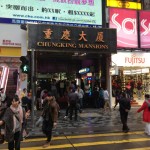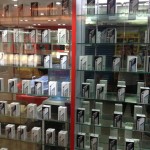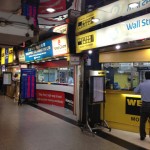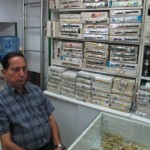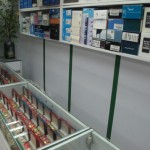I participated in Medill’s Global Residency Program where I completed a 10-week residency with MarketWatch in Hong Kong from September to November 2012. As part of the optional fifth quarter of my graduate program, I completed an independent study project with oversight from my Global faculty advisor, Professor Joe Mathewson. Below is my in-depth journalistic report on the mobile phone business in Chungking Mansions.
Evolve or fold: Chungking Mansions’ mobile phone business
KRISTENE QUAN
NOV. 28, 2012
The mobile phone business in Hong Kong’s Chungking Mansions, once a gateway for low-cost phones imported into Africa, is threatened because of greater scrutiny of the people involved in the illicit activities taking place on the premises.
But as the entrepreneurs in the building have done in the past, they are reinventing what role the property in Hong Kong’s Kowloon area serves, and how they can survive in this marketplace that has a high turnover.
Built in 1961, the 17-story building consisting of five towers is just two blocks north of The Peninsula Hotels group’s flagship property. Over the last 51 years, Chungking Mansions has gone from a Chinatown to an Indiantown, and has developed a reputation for being the stomping grounds for undesirables like heroin addicts, sex workers and illegal immigrants.
But it is also the location where some of the best ethnic cuisine in Hong Kong can be found; where tourists find some of the cheapest accommodations in the city; where Hong Kong’s ethnic minorities can meet people of the same culture; and where one can purchase cheap electronics.
Gordon Mathews, an anthropology professor at the Chinese University of Hong Kong, who has spent more than four years conducting research on Chungking Mansions, guesstimated that in 2009, 20 percent of mobile phones used in sub-Saharan Africa – the area of Africa that lies south of the Sahara, excluding Sudan – passed through Hong Kong’s Chungking Mansions.
However, in 2012, deals for mobile phones forged between African businessmen and South Asian storeowners is threatened as nodes in Chungking Mansions’ mobile phone business network are eliminated by businessmen’s inability to obtain Hong Kong visas.
“This trend is changing every day,” said Hussain, a Pakistani asylum seeker who has been in Hong Kong for seven years and is waiting for his Hong Kong identity card. “It depends purely upon the visa policy of Hong Kong,” he said.
Unless they have obtained permanent residency, a majority of the businesspeople involved in Chungking Mansions’ mobile phone business – many of whom are from Mongolia, Nigeria, India, Turkey, Egypt, Dubai, Taiwan, Singapore, Russia, Nepal, Somalia and Pakistan – come to Hong Kong on 90-, 30- or 14-day visit visas, depending on their nationality. Usually, if one is conducting business within the city, they must obtain a specific entry visa, which permits them to legally work for a period of time in Hong Kong.
According to a general enquiry representative at the Hong Kong Immigration Department, the difference between an entry visa and a visit visa is that an individual entering on a visitor visa may not legally take up work while in the city. However, “to work, study, establish or join in any business or to take up residence” in Hong Kong, an individual requires a specific entry visa and/or permit to do so; for instance, a student visa would allow the visa holder to take up studies while in Hong Kong for a set period of time.
However, when these businessmen are traveling to the city, Hong Kong immigration officers are allegedly stopping them between the aircraft they just deboarded and the gate entrance.
“On the entry point here in Hong Kong, they stand at the tube that gets you off the plane,” said Mohammad, a Somali asylum seeker who has been in Hong Kong for two years now and regularly brokers deals for clients in Africa.
“[If] you’re an Asian or an African, you get harassed…on [the] side, being questioned: ‘What do you want?’; ‘Show us how much money you have.’ It irritates a lot of people – they [are] no longer welcome coming to Hong Kong,” Mohammad said.
According to Wh Lai, a Hong Kong immigration officer, the immigration department has a mobilized team of officers patrolling the airport who can randomly check passengers in order to ensure the safety of others. However, Lai noted that the focus of these random checks is to determine the purpose of a passenger’s visit; identify the potential of criminals or criminal activities; ensure that passengers are “genuine” passengers; and that travelers have all of their necessary travel documents.
“The main purpose we’re focusing on is the purpose of their visit, rather than other points like gender, or race, or etc.,” Lai said.
From his research, Professor Mathews has found that most people in Chungking Mansions need to worry about the law to some degree as many storeowners understate sales on their annual income taxes, which he said is true throughout the city; many stores are selling copy goods that can be confiscated; or businesses have hired illegal workers, which could result in severe legal penalties if they are caught. However, Professor Mathews said that the Hong Kong police will not involve themselves in foreign trade: “If a container is going to Africa or something, they want nothing to do with it.”
“I think the police have always had this issue of staying out of as much of this trade as possible, and allowing it too,” Professor Mathews added. “If you were going to engage in extensive trade, they’re not going to bother you, that’s your business… If you get cheated that’s your business, that’s not something they’re going to look at.”
But the inability to enter the city is interrupting business as usual in Chungking Mansions, and storeowners and traders have been forced to find an alternative.
“Now a new trend has been adopted by the businessmen in Chungking Mansions because they are directly going to African and South Asian countries and opening shops and offices there,” Hussain said.
Chungking Mansions mobile phone wholesalers are cutting out the middlemen, and setting up shop directly in African countries in order to reach their customers. Mohammad described the current state of Chungking Mansions’ mobile phone business as going from “an individual trade to a corporate.”
“[There is] no need to have some kind of African partners,” Hussain added. “African countries are favoring the overseas traders, so they can open very easily the shops over there.”
This trend of Chungking Mansions mobile phone wholesalers going directly to their buyers is a move even established corporations are doing. BlackBerry smartphone maker Research in Motion announced in September that Africa was now a “priority one market” for the company and it will focus more heavily on the region. RIM will launch its next smartphone model, BlackBerry 10, in Africa at the same time as its more established markets.
The sustainability of the mobile phone business in Chungking Mansions relies on the relationships that traders, businessmen and wholesalers have established. “This is why business is actually booming here, because every person is connected to another 100, to another 1,000, and it’s all about that networking that brings the business here,” Mohammad said. “But the problem is that networking itself is losing positions.”
Chungking Mansions’ entrepreneurs know this lesson well, and are now looking for alternative goods to get into as the mobile phone market has such high turnover – many of the mobile phone stalls in Chungking Mansions have been open only for six to 12 months. However, there are some that have been around for longer periods of time, and they have weathered the changing marketplace by adapting.
One storeowner who knows this well is Murli Shamdasani. The Indian wholesaler has owned Modern Tex-Styles on Chungking Mansions’ first floor since 1976. In the last 36 years, Shamdasani has changed his business from textiles to watches, and has continued to adapt as the marketplace became oversaturated. His business is now a medley of watches, mobile phones, property rentals and currency exchange.
As the mobile phone business in Chungking Mansions is threatened, storeowners and traders are learning to dabble in other areas of trade. Their business structure is constantly evolving. So if it is not the mobile phone market, then they will move on to something else that consumers are demanding – continuously adding on to their current business, or changing it entirely.

